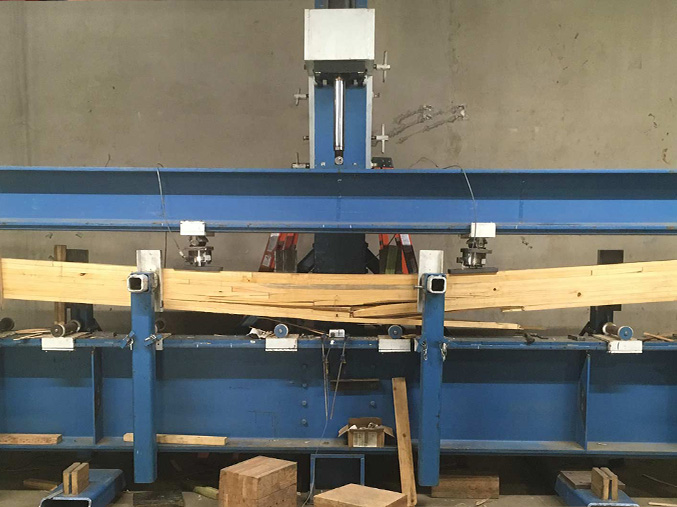ASTM D695 Compressive Load Testing of Timber
The ASTM D695 standard provides a comprehensive method for determining the compressive strength and modulus of elasticity of structural wood, such as laminated veneer lumber (LVL), glued-laminated timber (glulam), and other engineered wood products. This service is critical in ensuring that construction materials meet the stringent requirements set by building codes and engineering standards.
ASTM D695 testing involves applying a gradually increasing compressive load to a specimen until it fails. The test setup typically includes a universal testing machine (UTM) capable of precise load application and displacement measurement. Specimen preparation is crucial; the wood pieces are cut into rectangular prisms with specific dimensions as per ASTM D695 guidelines.
The quality and reliability of the results depend heavily on the accuracy of specimen preparation, correct setup in the testing machine, and consistent loading procedures. The test apparatus must be calibrated to ensure precise load application, and environmental conditions such as temperature and humidity should be controlled during the test to prevent moisture-induced deformation.
ASTM D695 specifies that specimens should be conditioned for at least 48 hours in a standard environment (temperature: 23°C ± 1.5°C, relative humidity: 50% ± 5%) before testing. This conditioning ensures that the specimen is free from stress and strain due to moisture content variations.
The test results are used by quality managers and compliance officers to ensure materials meet the required standards for structural integrity. R&D engineers use these data to refine product design and improve material performance. Procurement professionals rely on ASTM D695 testing to verify that purchased timber products comply with project specifications and regulatory requirements.
The test results are also essential in evaluating the durability of wood under load, which is crucial for long-term structural applications like bridge construction, skyscrapers, and other large-scale infrastructure projects. The modulus of elasticity obtained from ASTM D695 can help predict the behavior of timber under dynamic loading conditions, such as those encountered during earthquakes or high winds.
Engineers often use these test results to compare different types of wood products for optimal material selection. For example, comparing LVL and glulam using ASTM D695 data allows them to choose the most suitable product based on compressive strength requirements.
The ASTM D695 testing process is not only a regulatory requirement but also an important tool in quality control. By ensuring that timber products meet stringent standards for strength and elasticity, this service helps prevent structural failures and enhances public safety.
Benefits
- Ensures Compliance: ASTM D695 testing ensures that wood products meet international standards, which is essential for compliance with building codes and regulations.
- Promotes Safety: By accurately determining the compressive strength of timber, this service helps prevent structural failures in critical infrastructure projects.
- Enhances Quality Control: The precise measurement provided by ASTM D695 allows for better quality control during production and procurement processes.
- Informs Design Decisions: Engineers can use the test results to make informed decisions about material selection, which is crucial for optimizing structural performance.
- Supports Research and Development: ASTM D695 data provides a reliable basis for R&D efforts aimed at improving wood product design and performance.
- Aids in Procurement: Specified suppliers can demonstrate compliance with project requirements by providing test results from ASTM D695.
Quality and Reliability Assurance
- Calibration of Testing Equipment: The testing machine must be calibrated regularly to ensure accurate load application and precise measurement. This calibration is critical for obtaining reliable test results.
- Environmental Control: Specimens should be conditioned in a controlled environment to prevent moisture-induced deformation, which could affect the accuracy of the test results.
The quality assurance process also includes strict adherence to ASTM D695 specifications regarding specimen preparation and testing procedures. This ensures that all tests are conducted under standardized conditions, thereby enhancing the reliability of the results.
Quality control measures extend beyond the actual testing process to include regular calibration checks for equipment, periodic review of test protocols, and audits of laboratory practices to ensure consistency and accuracy in every test result.
Competitive Advantage and Market Impact
ASTM D695 Compressive Load Testing of Timber provides a significant competitive advantage by ensuring that materials meet the highest standards for strength and durability. This service is particularly valuable in markets where compliance with international regulations is mandatory, such as those in Europe (EN) or North America (ASTM).
By offering consistent, reliable test results, this service helps manufacturers establish credibility and trust among clients, thereby enhancing their market position. It also allows them to differentiate themselves by providing higher quality products that meet stringent standards.
The demand for ASTM D695 testing is expected to grow as more countries adopt international standards for construction materials. This trend presents an opportunity for laboratories offering this service to expand their client base and increase market share.
In addition, the growing emphasis on sustainable building practices has increased the need for reliable tests that ensure wood products are suitable for long-term structural applications. ASTM D695 testing plays a crucial role in meeting these demands by providing accurate data on wood product performance.





